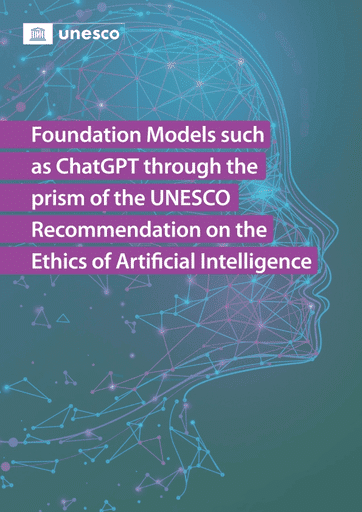
In light of increasing concerns across politics, public, and industry regarding the swift growth of AI foundation models, UNESCO has put forth a policy paper. This paper illustrates how the UNESCO Recommendation on the Ethics of AI (like ChatGPT and others, for example) can illuminate and clarify primary ethical issues associated with AI systems and direct policy responses.
Artificial Intelligence: UNESCO publishes Policy Paper on AI Foundation Models
In response to growing political, public and industry concern over the rapid proliferation of artificial intelligence (AI) foundation models and calls for regulation, UNESCO is publishing a policy paper demonstrating how the UNESCO Recommendation on the Ethics of AI can help identify and clarify key ethical concerns related to AI systems, guiding policy responses. The paper suggests a procedural framework to address and mitigate risks that may arise with their use across the AI project life cycle.
The Role of AI Foundation Models
Foundation models such as ChatGPT can bring potential risks across the AI project life cycle. This paper proposes a procedural framework to recognize and mitigate these risks.
The Double-edged Sword of AI
While AI ushers in countless opportunities, transforming how we tackle global issues, the excitement surrounding these systems is being overshadowed by the looming ethical concerns and potential damages they could cause.
Global Calls for AI Regulation
In the recent G7 Summit, leaders urgently demanded AI safety measures. Moreover, on 22 March 2023, many tech leaders signed an Open Letter on AI expressing anxiety about possible harm from Artificial General Intelligence, pushing for a 6-month pause in the development of potent AI systems. This sentiment was echoed by others, including health experts, who called for a halt in AI research until proper regulation can be established.
Risks and Misuse of AI
Several concerns include the misuse of AI by malicious parties, the growing incidence of AI misuse such as deepfakes, the magnification of existing biases, and AI’s role in the spread of disinformation and misinformation.
The UNESCO Policy Paper on AI
In reaction to these concerns, UNESCO published a policy paper that scrutinizes AI tools like ChatGPT under the lens of the UNESCO Recommendation on the Ethics of AI. The paper is founded on ethical principles and highlights the known effects of such models in the context of these principles and policy areas.
Fast Action Needed in AI Ethics
“It is important that we act fast to make sure that people and organizations are prepared to design and use these technologies, evaluating their impacts both ex-ante and ex-post. To do so, we provided clear analyses and policy advice based on the UNESCO Recommendation” , notes Gabriela Ramos, Assistant Director-General for Social and Human Sciences of UNESCO.
UNESCO’s Recommendation and G7 Regulation Calls
In response to the G7 leaders’ regulation calls, the policy paper proposes how the Recommendation can guide stakeholders in handling various concerns. This includes suggesting concrete actions and a procedural framework for ethically designing, developing, deploying, and procuring AI systems.
UNESCO’s AI Ethical Toolkit
UNESCO supports countries with a comprehensive toolkit of resources. These tools include the Readiness Assessment Methodology and Ethical Impact Assessment, and several expert networks. Furthermore, UNESCO collaborates with various other forums, such as the European Union and G20, to improve AI oversight and work toward a model governance framework.
UNESCO’s Timely Intervention
During a period of escalated worry over AI innovation superseding regulation, UNESCO’s policy paper is a pertinent response to industry developments. It emphasizes how the Recommendation on the Ethics of AI can guide decision-makers toward prompt and robust regulation.
With information from UNESCO.
* * * * *




